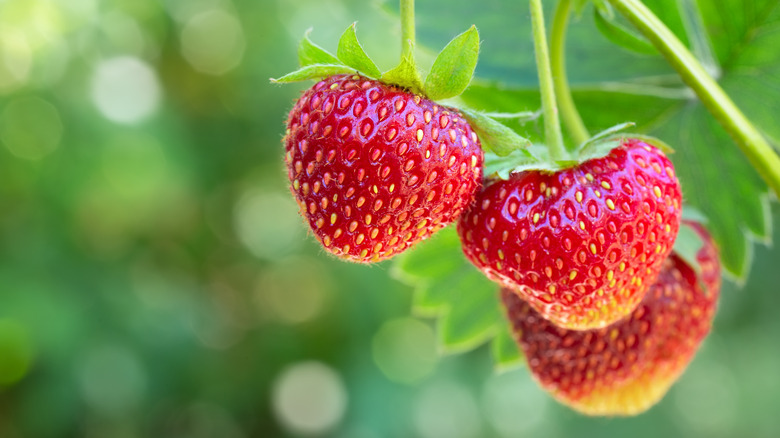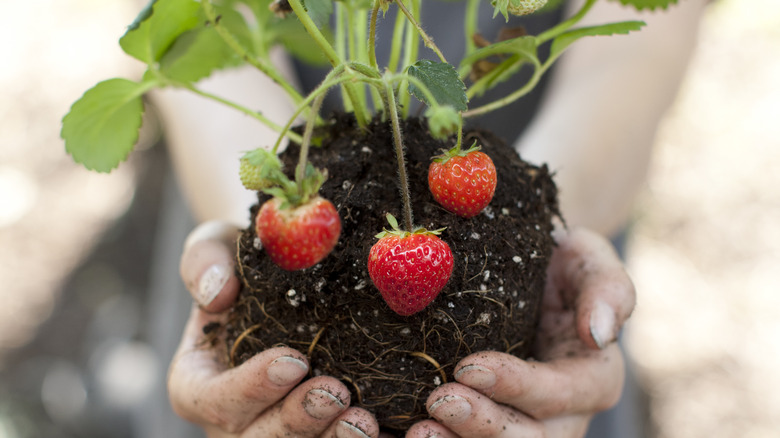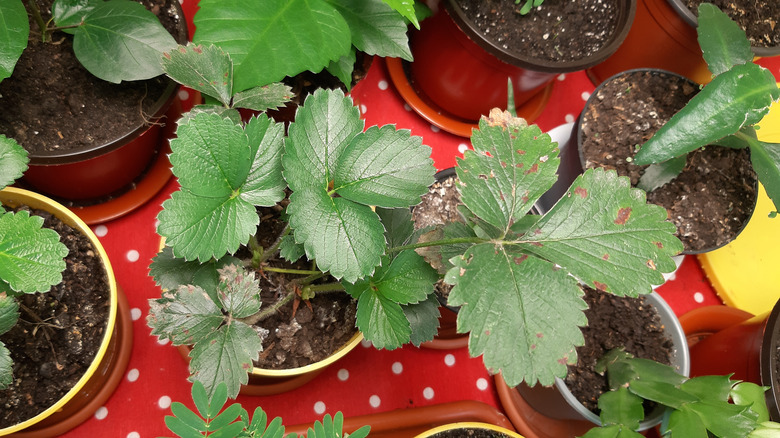Try This Tip When Planting Strawberries For A Happier And Healthier Plant
Strawberries, a home garden favorite, are relatively easy to grow, making them a summer staple for many who grow edible plants at home. What makes strawberries so great to grow yourself is that homegrown strawberries are incredibly flavorful and often sweeter than store-bought ones. Additionally, growing strawberries allows you to have control over the growing conditions, ensuring that they are free from harmful pesticides and chemicals while also reducing the plastic packaging they're typically sold in at stores.
Quite possibly one of the best tips about growing your own strawberries is that they grow well in small containers. These containers allow gardeners more flexibility with growing this delicious fruit, such as growing them inside during cooler months or even moving them around to attain more hours of sunlight. So whether you're hankering for a home-grown sweet treat or simply want to increase your garden's bounty, consider starting your strawberries in smaller planters next season.
The benefits of growing strawberries in small planters
Planting strawberries in smaller containers rather than larger ones can be a beneficial choice for a bountiful harvest. First, smaller containers allow for better control over the soil conditions. Strawberries prefer well-drained soil, and smaller containers make it easier to ensure that the soil is not waterlogged. Excess water can lead to root rot and other diseases, which can harm the plant's overall health and productivity. With smaller containers, it is easier to monitor and adjust the moisture levels, providing the strawberries with optimal growing conditions.
Secondly, smaller containers promote better air circulation around the plants. Good air circulation is crucial for preventing the growth of fungal diseases, such as powdery mildew. In larger containers, the plants may become overcrowded, restricting the airflow and creating a more favorable environment for fungal growth. By growing strawberries in smaller containers, there is more space between the plants, allowing for improved air circulation and reducing the risk of disease.
Finally, smaller containers are more manageable and easier to maintain. They require less soil, fertilizer, and water compared to larger containers. This can be particularly advantageous for gardeners with limited space or those who want to grow strawberries on a small balcony or patio. Smaller containers are also easier to move around, which can be beneficial for adjusting the plants' exposure to sunlight or protecting them from extreme weather conditions.
How to plant your strawberries
To plant strawberries in small containers for optimal growth, there are a few key steps to follow. Choose a garden container that is appropriate for the size of the plant. A container with a diameter of at least 8 inches is best for the plant to grow. Make sure the container has drainage holes to prevent waterlogging.
Next, prepare the soil mixture. Strawberries prefer well-drained soil, so it's important to create a loamy mixture that allows for proper drainage. A good soil mixture can be made by combining equal parts of potting soil, compost, and perlite or vermiculite. This mixture will provide the necessary nutrients and drainage for the strawberry plant. Once the container and soil mixture are ready, it's time to plant the strawberries. Start by filling the container with the soil mixture, leaving about an inch of space at the top. Gently remove the strawberry plant from its nursery container and place it in the center of the container, making sure the crown—where the leaves meet the roots—is level with the soil surface.
After planting, water the strawberry plant thoroughly to settle the soil and remove any air pockets. It's important to keep the soil consistently moist but not waterlogged. Monitor the moisture levels regularly and adjust watering accordingly. Finally, place the container in a location that receives at least eight hours of sunlight per day. Strawberries thrive in full sun, so choose a spot that provides ample sunlight.


